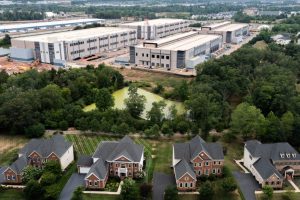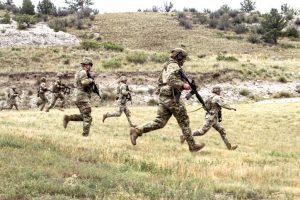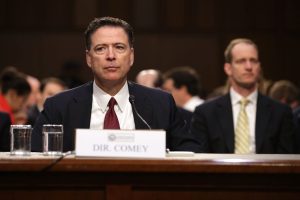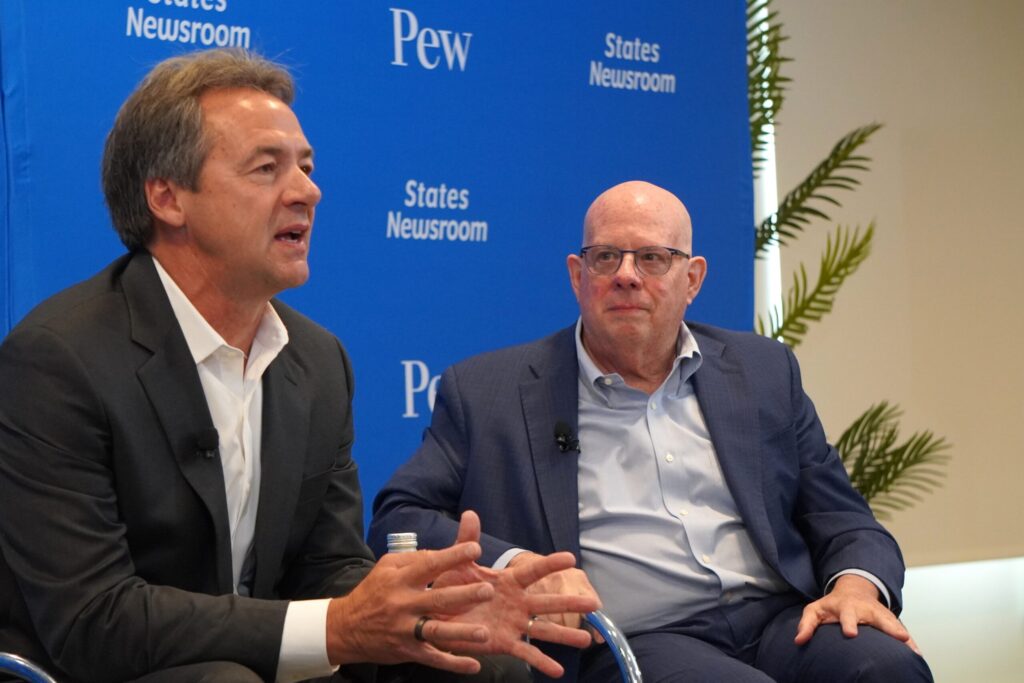
Former Gov. Steve Bullock, D-Montana, (left) and former Gov. Larry Hogan, R-Maryland, (right) said that current governors may be missing an opportunity to have a bigger role in national issues that seem relegated to Congress and the White House if they were able to come together. (Photos by Danielle Brown/Maryland Matters)
In a country flooded by a never-ending wave of talking heads, pundits and fiery social media posts, two bipartisan former governors said the solution to America’s political gridlock may be more talking.
But former Maryland Gov. Larry Hogan, a Republican, and former Montana Gov. Steve Bullock, a Democrat, said that it’s not about talking on airwaves or to like-minded political party members. Instead, it’s about sitting and talking about common ground — together — face-to-face.
That was the message the two former state leaders and former chairmen of the National Governors Association said during an hour-long panel, “Federalism Tested: How States are Navigating in an Era of Uncertainty,” hosted by the Pew Charitable Trusts and States Newsroom on Tuesday morning.
Both Bullock and Hogan said that despite an apparent growing list of issues that divide the country, most Americans agree on one thing: They’re exhausted by the partisan rhetoric and political gridlock and want politicians to find common ground.
They said that organizations like the National Governors Association provide models for how to find common ground and advocate for solutions. And both governors know something about bipartisan work as Hogan, a member of the GOP, served two terms in Maryland, a state dominated by Democrats. Meanwhile, Bullock, a Democrat, served two terms, accomplishing Medicaid expansion and campaign spending reform, with a legislature of nearly two-thirds Republicans.
“There’s more that unites us than divides us,” Hogan said, adding it was a message that resonated with deeply liberal Maryland, because it stressed common solutions and bipartisanship.
“The politics that divide the nation need not divide the state,” Hogan said. “These days, people seem to want to win an argument rather than provide solutions to solve problems.”
Current governors may be missing an opportunity to have a bigger role in the national issues that seem relegated to Congress and the White House, they said. They agreed that if governors were able to come together, they may be better at checking the power of Congress or the president.
“You actually have to govern when you’re a governor,” Bullock said. “And that means you have to stay focused on what’s happening in your own state and to your people.”
That gives governors power to communicate concerns and stand together to influence federal leaders. One example they used was the way the governors’ association worked together during the COVID pandemic. Instead of meeting quarterly, they had weekly meetings via Zoom.
“We didn’t all agree, but we didn’t fight. We simply said: These are the things we need. It was productive,” Hogan said.
Hogan also touted the large infrastructure bill that was shaped by bipartisan input from governors of both parties.
“We don’t see enough of that,” Hogan said.
Both said governors are crucial in the feedback circle because they can pierce the federal bubble in Washington, D.C.
For example, Hogan said that Maryland, during his tenure, was able to eliminate 7,000 jobs through “a scalpel and attrition,” resulting in savings, efficiency and maintaining a high approval rating as governor, nearing 75% statewide.
“What happened with (the Department of Government Efficiency) is we took a meat ax instead of an instrument of precision,” Hogan said. “And every time you lay someone off, it will affect real people.”
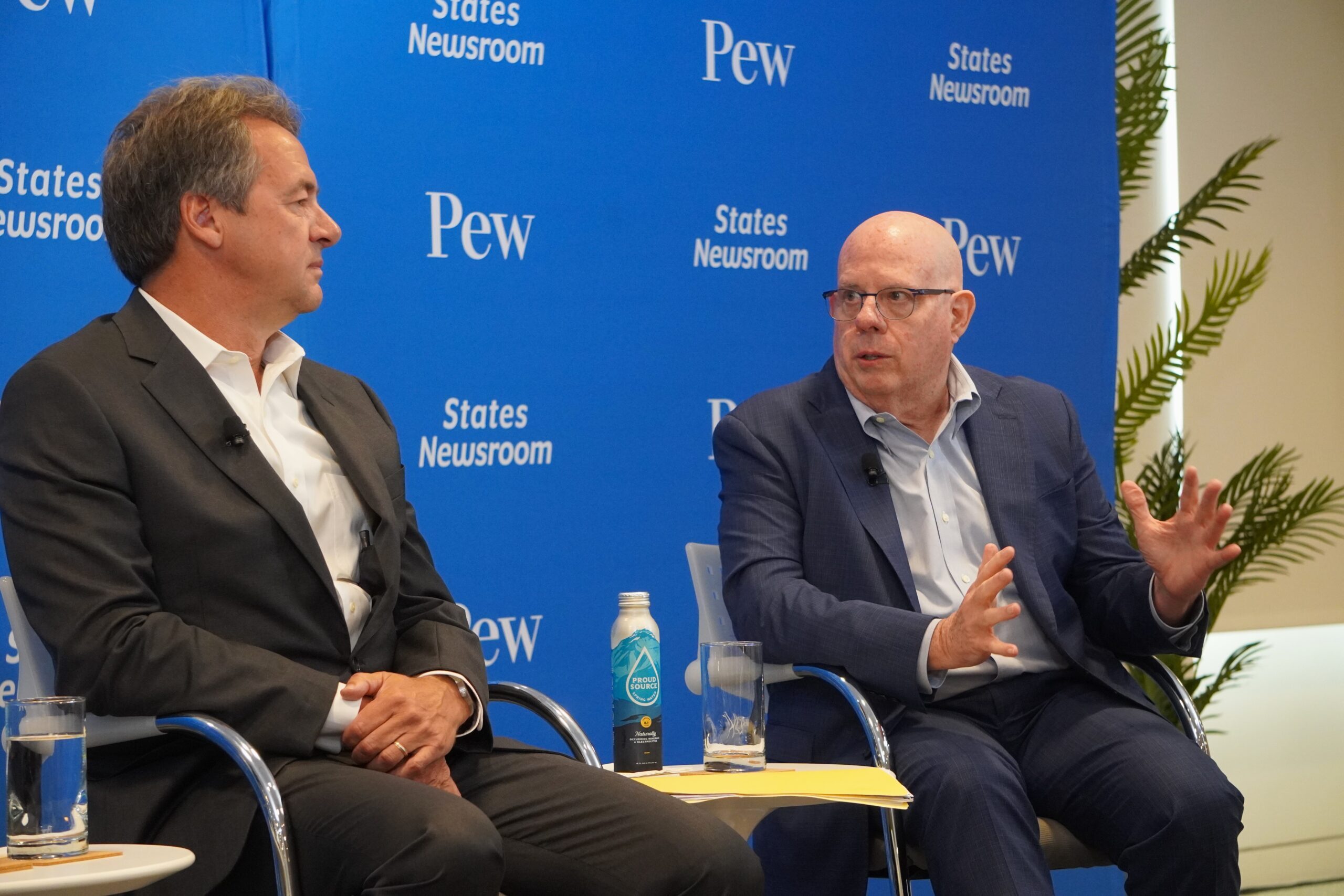
It’s those people whom governors are the closest to, and those stories can be shared by the state leaders.
In Montana, Bullock said, the impacts may be noticeable when visitors travel for “a trip of a lifetime” to places like Yellowstone and Glacier national parks, which may have fewer amenities, or have extraordinary lines.
“At the end of the day, state government isn’t going to be paying for those employees, so when someone has their lifelong dream vacation in Glacier National Park, and can’t get to where they want, states will have to work with federal services,” Bullock said. “Unfortunately, folks have to feel pain for it to be real.”
He also called for more accountability for elected leaders down to the local level who avoid answering constituent questions or press inquiries. He said the media must continue to hold officials accountable by telling the public when leaders won’t speak, and what questions were asked.
Moreover, he said that true bipartisanship begins with individuals who are willing to support leaders whom they don’t always agree with, but demonstrate a commitment to bipartisan solutions.
“Why is it that the most dangerous place in America today is around the Thanksgiving table?” Bullock asked.
Hogan said that extreme gerrymandering and political primaries that select the more extreme sides of each party contribute to a sense of gridlock and polarization.
“We have an exhausted majority,” Hogan said. “The public is sick of it, and that’s why people are fleeing from both parties, becoming political independents.”



